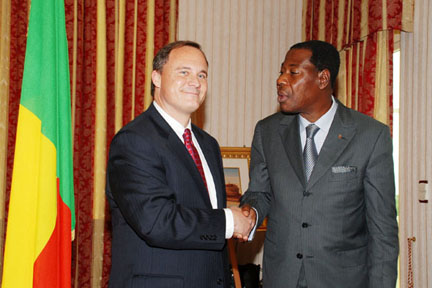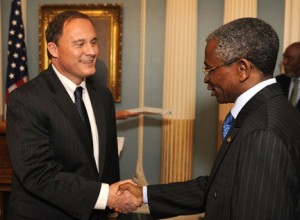By Lori H. Burke
Though far from being the largest nation on the African continent, the Republic of Benin is a powerful beacon of hope for supporters of democracy and human rights around the world. As the West African country makes steady progress, it will be supported by the newly appointed U.S. ambassador, Michael Raynor ’84.

Michael Raynor ’84 (left) with Benin’s president, Dr. Thomas Boni Yayi, at the presentation of his diplomatic credentials at the Presidential Palace in Cotonou Sept. 13.
A career member of the Senior Foreign Service, Raynor has devoted 20 of his 24 years to advancing U.S. relations with Africa. He served 14 years at embassies in Congo, Djibouti, Guinea, Namibia, and Zimbabwe. He also spent six years working in various positions at the State Department’s Bureau of African Affairs in Washington, D.C., most recently as executive director. An international affairs graduate, he holds a master’s in international affairs from Columbia University.
Raynor, who arrived at the embassy in Cotonou, Benin, in late August, welcomes the opportunity to resume a frontline diplomacy role on the African continent. Raynor’s nomination by President Obama was confirmed May 24 by the Senate.
Raynor is the second alumnus named to an ambassadorship in Africa. Marcia Bernicat ’75 was ambassador to Senegal and Guinea-Bissau. Read more.
“African environments can be challenging. The infrastructure and economies are not standard, which means the work of administering embassies in those contexts is not standard either,” he says. “And, because you’re living and working in difficult and potentially unsafe environments, doing management in those contexts feels more rewarding.”
Raynor says his experience at Lafayette prepared him well for the difficulties of creating opportunities for connection in a new culture.

Michael Raynor ’84 (left) greets Cyrille Oguin, Benin’s ambassador to the United States, at the swearing-in ceremony July 24 in Washington, D.C.
“Our ability to reach out to the citizens of the country we’re in—to promote cultural understanding, to promote cultural exchange—is vital,” says Raynor. “The interdisciplinary approach of Lafayette’s international affairs major examined all the permutations and influences that pertain to an issue. The program has an element of breadth, an element of creativity, that provides a way of looking at things that is enormously valuable in this business. And, it has been incredibly relevant in my career.”
Raynor particularly recalls Ilan Peleg, Charles A. Dana Professor of Government and Law, and June Schlueter, professor emerita of English. “Professor Peleg was so insightful and had such depth and international standing. It was exciting to have access to that sort of thinking,” he says. “And, I enjoyed my classes with Professor Schlueter, who brought me into The Marquis literary magazine, which I later had a chance to edit.”
Raynor’s return to Africa comes at an important period in Benin’s development.
“It’s an exciting time to be an ambassador to an African country, and particularly, Benin,” he says. “Its standing as a stable, democratic country is important for the Benin citizen, of course. But, it’s also important from a U.S. perspective to show other African countries and other parts of the world that democracy is relevant in an African context.”
Benin is a member of the U.N. Human Rights Council and a leader of reform on the African continent.
Beninese President Thomas Boni Yayi, who is also the president of the African Union, is pursuing greater African ownership of HIV/AIDS initiatives, increased coordination of economic development efforts, and steady progress on democracy and human rights.
These efforts are of strategic importance to the United States.
“We’ve come to realize that the really important issues are those that cross borders–terrorism, global health, food security, trafficking in people, trafficking in arms and drugs. Africa has a really important role to play, for good or bad, depending on how we manage our relations and engagement,” he explains. “These issues have potential impact on U.S. security and prosperity, so what we can do to engage in Africa is very significant to our own interests.”
In the coming months, a major focus for Raynor will be supporting Benin in its effort to apply for a second Millennium Challenge Corporation (MCC) compact. The first compact, which brought $300 million in U.S. foreign aid to the country, launched projects to improve economic prosperity.
Fellow alumni among the team of highly skilled professionals serving with Raynor at the U.S. embassy in Benin are Stephen Orloff ’04, foreign service specialist, and Jennie O’Brien Orloff ’06, community liaison office coordinator.

